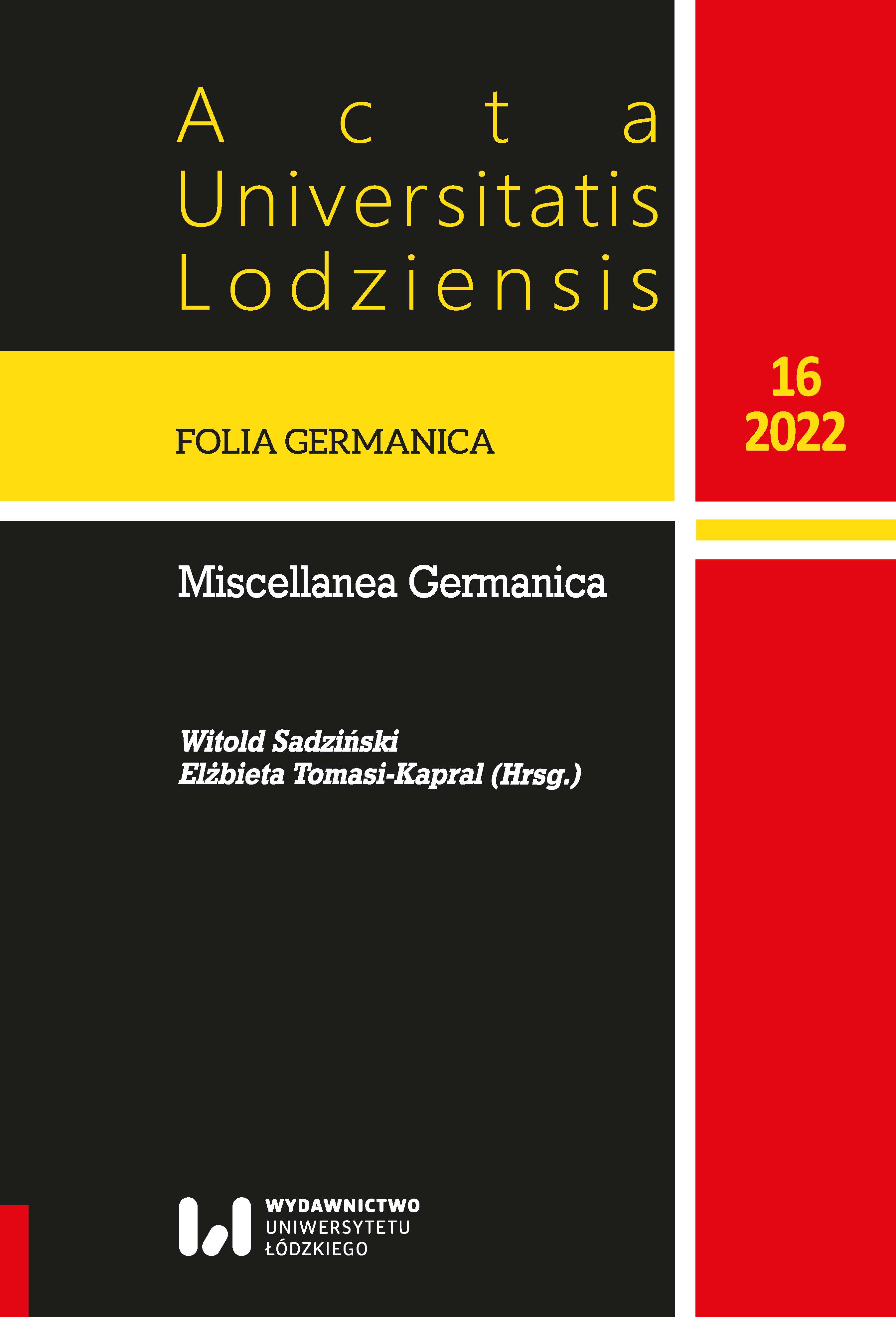„I am not and have never been a communist“: Klaus Mann and his relation to communism
DOI:
https://doi.org/10.18778/1427-9665.16.08Keywords:
The 3rd Reich, Klaus Mann, Emigration, Communism, national socialismAbstract
Klaus Mann (1906–1949) belonged to generation influenced by the two World Wars, burgeoning communism, and rising nationalism. Political component in his work is very strongly articulated not only in novels and essays, but also in autobiographical work. This emphasises his fascination in times he lived, but most of all it expresses his own involvement in fighting the evil which in his eyes were represented by Hitler and Nazism. In Mann’s eyes communism was not solely represented as a political system, but rather an ally in his personal crusade. In the literature there is often a question asked whether Klaus Mann was a communist or an ideologist whose majority of opinions were in line with ideological assumptions and values of the communist system. Despite clear declarations of the author himself, it is worth to look into his inner development: from fascination through growing distance and eventually disappointment which resulted in detaching himself from the communist ideas.
References
Eddy B.D. (2018), Erika und Klaus Mann. New York u.a.
Google Scholar
Dirschauer W. (1973), Klaus Mann und das Exil. Worms.
Google Scholar
Gołaszewski M. (2018), Die tödliche Wunde bei Klaus Mann. In: L. Kolago (Hrsg.) „Studia Niemcoznawcze – Studien zur Deutschkunde“, Nr. 61. Warschau, S. 543–554.
Google Scholar
Grumbach D. (1984), Kämpfen ohne Hoffnung – Leben und Politik bei Klaus Mann. „Kürbiskern“, Nr. 3, S. 119–125.
Google Scholar
Grunewald M. (1985), Klaus Mann und das politische Engagement. In: K. Mann, Mit dem Blick nach Deutschland.Der Schriftsteller und das politische Engagement. München.
Google Scholar
Kröhnke F. (1981), Propaganda für Klaus Mann. Frankfurt am Main.
Google Scholar
Laemmle P. (1989), Nachwort. In: K. Mann, Tagebücher 1931–1933. München, S. 189–207.
Google Scholar
Mann K. (1969), Die Heimsuchung des europäischen Geistes. In: K. Mann, Heute und Morgen, München, S. 317–338.
Google Scholar
Mann K. (1969), Die Tragödie Jan Masaryk. In: K. Mann, Heute und Morgen, München, S. 293–300.
Google Scholar
Mann K. (1969), Notizen in Moskau. In. K. Mann, Heute und Morgen. München, S. 107–122.
Google Scholar
Mann K. (1980), Der Kampf um den jungen Menschen. In: K. Mann, Woher wir kommen und wohin wir müssen. München: Anmerkungen.
Google Scholar
Mann K. (1980), Woher wir kommen und wohin wir müssen. München: Anmerkungen.
Google Scholar
Mann K. (1984), Der Wendepunkt.Ein Lebensbericht. Hamburg.
Google Scholar
Mann K. (1986), Kind dieser Zeit. Hamburg.
Google Scholar
Mann K. (1987), Briefe und Antworten 1922–1949. München.
Google Scholar
Mann K. (1989), Tagebücher 1934–1935. München.
Google Scholar
Mann T. (1981), Der Vulkan – Roman unter Emigranten. Hamburg.
Google Scholar
Mattenklott G. (1979), Homosexualität und Politik bei Klaus Mann. In: U. Naumann, Sammlung. Jahrbuch für antifaschistische Literatur und Kunst. Bd. 2. Frankfurt am Main, S. 29–38.
Google Scholar
Naumann U. (1984), Klaus Mann. Hamburg.
Google Scholar
Schiller D. (1983), Geistige Differenz und politische Disziplin. Klaus Mann zwischen 1930 und 1935. In: S. Schlenstedt (Hrsg.), Wer schreibt, handelt. Berlin–Weimar.
Google Scholar
Schneider R. (1956), Klaus Mann. In: Aufbau, Jhrg. 12, S. 1105–1119.
Google Scholar
Stephan A. (1979), Die deutsche Exilliteratur 1933–1945. München.
Google Scholar
Walter H.A. (1969), Ein Bürger verläßt seine Klasse. „Die Zeit“, Nr. 41 vom 10. Oktober 1969, Literaturbeilage.
Google Scholar
Wegner M. (1967), Exil und Literatur. Frankfurt am Main.
Google Scholar
Weil B. (1983), Klaus Mann: Leben und literarisches Werk im Exil. Frankfurt am Maine.
Google Scholar
Downloads
Published
Versions
- 2023-08-22 (2)
- 2022-12-30 (1)
How to Cite
Issue
Section
License

This work is licensed under a Creative Commons Attribution-NonCommercial-NoDerivatives 4.0 International License.










